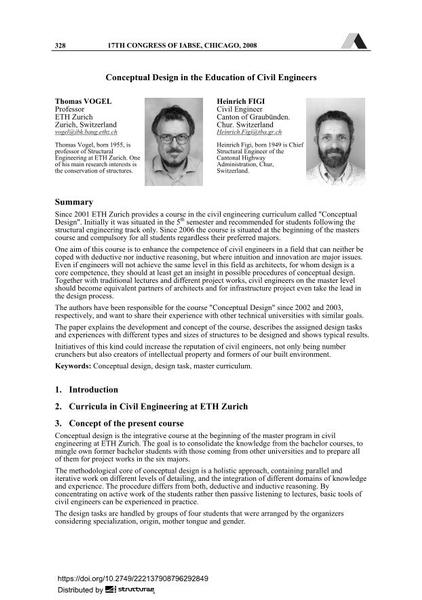Conceptual Design in the Education of Civil Engineers

|
|
|||||||||||
Bibliographic Details
| Author(s): |
Thomas Vogel
Heinrich Figi |
||||
|---|---|---|---|---|---|
| Medium: | conference paper | ||||
| Language(s): | English | ||||
| Conference: | 17th IABSE Congress: Creating and Renewing Urban Structures – Tall Buildings, Bridges and Infrastructure, Chicago, USA, 17-19 September 2008 | ||||
| Published in: | IABSE Congress Chicago 2008 | ||||
|
|||||
| Page(s): | 328-329 | ||||
| Total no. of pages: | 8 | ||||
| Year: | 2008 | ||||
| DOI: | 10.2749/222137908796292849 | ||||
| Abstract: |
Since 2001 ETH Zurich provides a course in the civil engineering curriculum called "Conceptual Design". Initially it was situated in the 5th semester and recommended for students following the structural engineering track only. Since 2006 the course is situated at the beginning of the masters course and compulsory for all students regardless their preferred majors. One aim of this course is to enhance the competence of civil engineers in a field that can neither be coped with deductive nor inductive reasoning, but where intuition and innovation are major issues. Even if engineers will not achieve the same level in this field as architects, for whom design is a core competence, they should at least get an insight in possible procedures of conceptual design. Together with traditional lectures and different project works, civil engineers on the master level should become equivalent partners of architects and for infrastructure project even take the lead in the design process. The authors have been responsible for the course "Conceptual Design" since 2002 and 2003, respectively, and want to share their experience with other technical universities with similar goals. The paper explains the development and concept of the course, describes the assigned design tasks and experiences with different types and sizes of structures to be designed and shows typical results. Initiatives of this kind could increase the reputation of civil engineers, not only being number crunchers but also creators of intellectual property and formers of our built environment. |
||||
| Keywords: |
conceptual design design task master curriculum
|
||||
